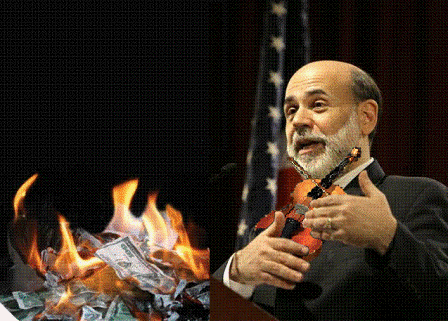Last week’s swap line number reported by the Fed was down to $521 billion from $608 billion. While still a very large number, it is coming down, and hopefully will continue to do so.
However, the continued fall in commodities prices, particularly crude oil, means dollars are ‘harder to get’ for the foreign sector, as they must export more product to the US for the same amount of dollars. And with the US consumer weakening, obtaining $US via exporting to the US will be that much more problematic.
Here is what Chairman Bernanke said yesterday about the swap lines.
Federal Reserve Policies in the Financial Crisis
In our globalized financial markets, the provision of dollar liquidity has international as well as domestic aspects. To improve dollar funding conditions in important foreign markets, the Federal Reserve has approved bilateral currency swap agreements with 14 foreign central banks. Swap facilities allow each of the central banks involved to borrow foreign currency from the other; in this case, foreign central banks such as the Bank of Japan, the European Central Bank, the Bank of
England, and the Swiss National Bank
And the Bank of Mexico, and other lesser CB’s.
have borrowed dollars from the Federal Reserve to re-lend to banks in their jurisdictions.
Yes, it’s a case of $US loans to foreign governments.
This is functionally no different than the Fed buying, for example, Mexican $ bonds.
Because short-term funding markets are interconnected, the provision of dollar
liquidity in major foreign markets eases conditions in dollar funding markets globally, including here in the United States.
Yes, that is true.
Lending to those less credit worthy does decrease their demand to borrow USD.
And that’s exactly the reason the Fed is lending virtually unsecured to lesser credits- to get interest rates down?
On a risk/reward basis this makes no sense to me.
There are far less costly ways to get USD LIBOR down.
Importantly, these swap arrangements pose essentially no credit risk because our counterparties are the foreign central banks themselves, which take responsibility for the extension of dollar credit within their jurisdictions.
So lending to the Bank of Mexico poses no credit risk?
And the ECB is shell company not guaranteed by the national governments.
And they’ve been criticizing the banking industry for poor underwriting criteria- this is far, far worse.
And would Congress approve the purchase of foreign USD bonds solely as a means to lower USD LIBOR? Is Congress aware that the Fed is authorized to do this?
Hopefully we get lucky and all the central banks politely pay us back.
[top]

